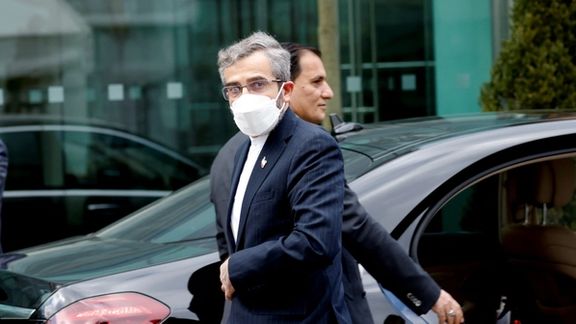Iran's Nuclear Negotiator Says Messages Being Exchanged With US

Iran’s chief nuclear negotiator, Ali Bagheri-Kani, says “negotiations in the framework of exchanging indirect messages between the two sides continue.”

Iran’s chief nuclear negotiator, Ali Bagheri-Kani, says “negotiations in the framework of exchanging indirect messages between the two sides continue.”
The government’s official news website IRNA Sunday published an interview Bagheri had with Al Manar TV in Lebanon, where he tried to reassure the public that the chance to revive the 2015 nuclear agreement is not lost and talks are taking place.
The Islamic Republic faces multiple economic and political crises that have deepened in the past six months, as 18 months of indirect talks with the United States failed to produce a result and popular protests dealt a further blow to Tehran’s political standing.
The Biden Administration announced in October that its focus has shifted from the nuclear issue to supporting the rights of Iranian protesters and increasingly a negative mood emerged about the chances of any new talks.
“In the past year and a half when talks were taking place, the speed of negotiations might have increased and decreased at times but there was a continuity. Now also [talks] are taking place in the framework of exchanging messages between the two sides,” Bagheri said.
The Biden Administration has not explicitly denied exchange of messages with Tehran.
Iran International reported in January that the State Department did not deny information obtained by the network that US Iran Envoy Robert Malley had held meeting in New York with Tehran’s UN ambassador.
In response to questions submitted by Iran International on January 17, State Department spokesperson Ned Price said, “We have the means to deliver specific and firm messages to Iran when it is in America’s interest to do so.”
The contents of Malley’s meetings with the Iranians remain unclear, but the issue of Americans held hostage in Tehran or regional issues are all intertwined with the nuclear negotiations.
In early November, President Joe Biden told a citizen who asked him about the nuclear talks during an election campaign event that the “JCPOA is dead.” Bagheri commented about this and said that later US officials spoke about this – referring to comments that diplomacy will continue – and “in practice messages are being exchanged.”
Bagheri also did not deny that Qatar is playing a mediating role
There was little else new in what Iran’s chief negotiator had to say about the nuclear talks or the increasingly tense relations with the West. He repeated Supreme Leader Ali Khamenei’s accusation that the West instigated the protests in Iran.
He also reiterated that Iran’s most important “red line is the issue of guarantees”, that in case of a deal “the other party discharges its commitments.” Throughout the talks Tehran has been insisting on receiving guarantees from the United States that it will not pull out of an agreement, similar to President Donald Trump’s decision in 2018. Tehran is also insisting that it should receive the economic benefits once sanctions are lifted.
The US has said that it cannot guarantee an accord, which is not a treaty, beyond the term of the current administration.
However, on the issue of sanctions, Bagheri appeared to demand that only economic sanctions imposed by the Trump administration, not mentioning many new sanctions imposed by the current administration on companies and individuals.
Facing a worsening economic crisis and a popular revolt, Tehran wants to exhibit an aura of normalcy and hope. The target of positive statements about the chances of talks with the West is more the domestic audience that fast is losing hope in the future.